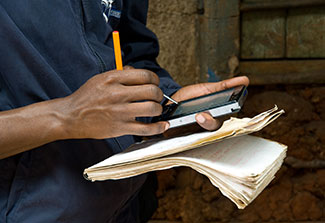Focus on mobile health: Developing health solutions to improve health
January / February 2020 | Volume 19, Number 1

Photo by David Snyder/CDC Foundation
CC BY 2.0
Since 2014, Fogarty has provided funding to catalyze
development of mobile health technologies and support
research to study their effectiveness.
By Susan Scutti
The speed of technological advances and the ubiquity of cellphones - even in low-resource settings - have created tremendous opportunities to deploy mobile health to advance research and improve health, especially in remote areas. The explosion of available health data, combined with advances in machine learn-ing or artificial intelligence, provide great potential.
Since its inception in 2014, Fogarty’s
Mobile Health: Technology and Outcomes in Low and Middle Income Countries program has supported projects to catalyze innovation through multidisciplinary research that addresses global health problems. Through more than 60 grants Fogarty is helping develop an evidence base for the use of mobile technology solutions to improve health, as well as to strengthen mHealth research capacity in low- and middle-income countries (LMICs).
A broad range of novel initiatives has been supported, such as portable diagnostic devices, apps to improve adherence to disease treatment protocols and text messaging programs to encourage healthy behaviors. The grants fund technology development, as well as rigorous feasibility and effectiveness studies.
A number of the projects are designed to overcome barriers to care that exist in many underserved LMIC communities, including lack of transportation to clinics, inadequate numbers of doctors and the chronic shortage of health care workers. By using cellphones to connect rural patients with knowledgeable care providers, diagnoses can be made and treatment recommendations can be given remotely. Also, mobile devices can provide front-line health care workers with access to current information, treatment guidelines and the ability to consult electronically with experts, when needed.
Other grantees have explored adapting and developing powerful yet inexpensive, portable microscopes and probes that can be connected to cellphones, bringing diagnostic capabilities to remote populations. With instant diagnoses, patients can begin treatment immediately, without the need to return later for test results. Projects are exploring mHealth technologies to screen for a variety of issues including breast and cervical cancer, anemia and hearing loss.
Text messaging programs are also being created and studied for their effectiveness at encouraging behavior change, such as smoking cessation, or promoting adherence to challenging treatment protocols including those required for people living with TB and HIV/AIDS. Other projects are exploring more effective ways of remotely managing gestational diabetes, providing support to breastfeeding mothers, and monitoring bipolar disorder and depression.
Several initiatives are examining best practices in using mHealth to promote distance learning, so that health care workers on the front lines can develop expertise in cancer and other specialized topics.
To help establish a community of practice among those studying potential mHealth solutions in LMICs, Fogarty’s Center for Global Health Studies (CGHS) hosted a training institute on the NIH campus and has made the
curriculum freely available on the Center’s website.
In addition to Fogarty, mHealth program cosponsors include the National Cancer Institute (NCI), National Institute of Biomedical Imaging and Bioengineering (NIBIB), National Institute of Mental Health (NIMH), NIH Office of Behavioral and Social Sciences Research (OBSSR), the
Eunice Kennedy Shriver National Institute of Child Health and Human Development (NICHD), National Institute on Deafness and Other Communication Disorders (NIDCD), National Institute of Neurological Disorders and Stroke (NINDS), and NIH Office of Research on Women's Health (ORWH).
More Information
Resources and publications related to the article
Innovative microscope enables early cancer diagnoses:
Resources and publications related to the article
Scientists develop app to diagnose, treat leishmaniasis:
Resources and publications related to the article
Mobile tool designed to alleviate late-stage cancer pain:
To view Adobe PDF files,
download current, free accessible plug-ins from Adobe's website.